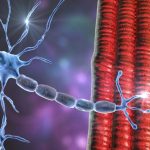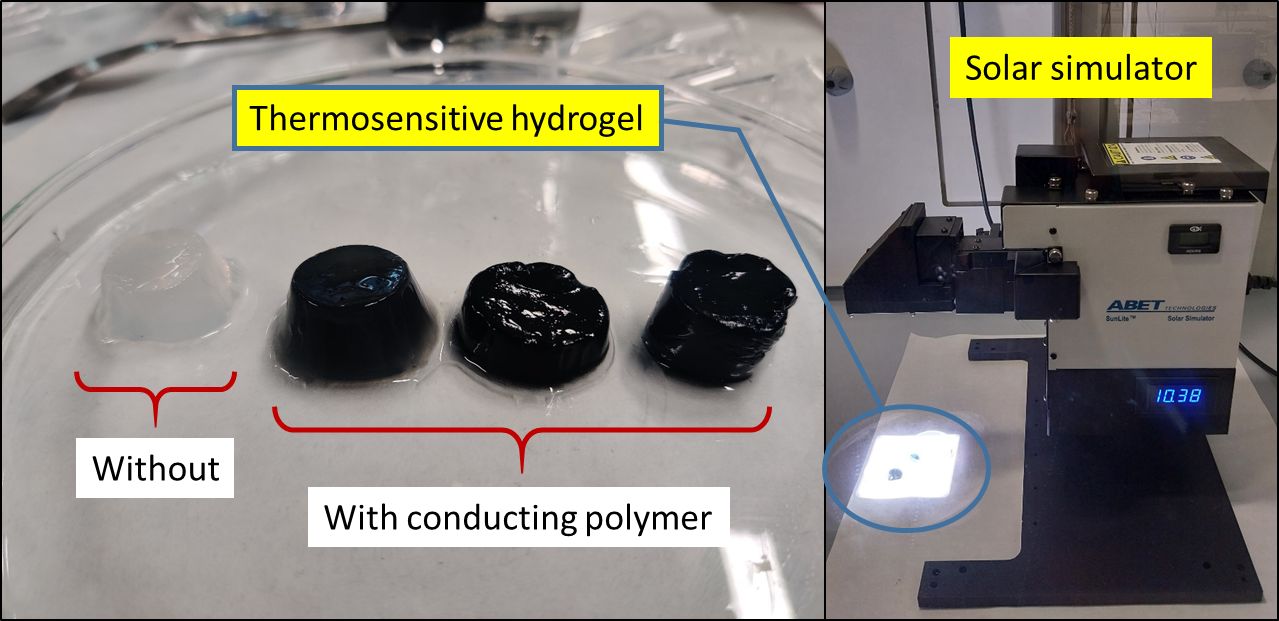
Hybrid neuroscience to achieve excellence in motor rehabilitation research and neuromuscular disorders
June 19, 2023
Reduction of the use of copper in horticultural crops through microencapsulation
July 3, 202329/06/2023
Almost two billion people live in countries with high water stress. In the coming decades, this situation will worsen, due to the increase in water demand and the impact of climate change, which is already being noted with a severe drought in the entire Mediterranean region in recent months. For this reason, it is vital to find new materials for water desalination to try to alleviate water scarcity.
Thermosensitive hydrogels are polymers that can undergo controlled changes in their hydration depending on the temperature to which they are exposed. Due to their three-dimensional porous network, hydrogels can absorb a large amount of water without dissolving in it. Thermosensitive hydrogels can expel the water when they get warm (approximately above 32ºC), which generates water that is free from salts. For this reason, in recent years their efficiency in direct osmosis desalination systems has been researched and verified. Some researchers have achieved an evaporation efficiency of around 70% of the water absorbed by the hydrogel in only 10 minutes, to reach a rate of ∼26 KMH (kg/metres squared × hour) of clean water. This is enough to meet the daily water demand of an adult person. To boost its capacity to “expel water”, compounds are generally used that can absorb energy, such as conductive polymers. Conductive polymers are compounds that can respond to light and act as a photothermal absorbent. In addition, they can be used potentially as light, semiconductive materials in electrochemical applications, such as the semi-solid electrodes that are used in desalination technologies for brackish water or seawater.
In this context, the TherGel project is being developed. This project is led by the research group in Innovation in Materials and Molecular Engineering - Biomaterials for Regenerative Therapies (IMEM-BRT), at the Universitat Politècnica de Catalunya - BarcelonaTech (UPC). The aim of TherGel is to combine the properties of both materials in a conductive polymer hydrogel that could be used in water evaporation systems, as filtration membranes and as solid-state electrolytes that are active in electrochemical cells of capacitive deionisation of salt water.
The project is designed to develop a prototype of self-purification of water in homes, without the need for electricity consumption or pressure equipment, simply using the heat energy of the sun. The development of low-cost technologies for water purification is an important strategy to meet current and future water needs adapted to domestic consumption and framed within the Sustainable Development Goals (SDG 6 - Clean water and sanitation).
Budget and funding
TherGel is a technological innovation project that is part of the grant programme State Plan for Scientific and Technical Research and Innovation (PEICTI) 2017-2020 of the Spanish State Research Agency (AEI), with a budget of €138,545, and a duration of three years (September 2022 – September 2025) [PID2021-125257OB-I00].


Sector
Topic
You want to know more?
Related Projects
- The Visualisation, Virtual Reality and Graphic Interaction Research Group (ViRVIG) at the Universitat Politècnica de Catalunya - BarcelonaTech (UPC) has participated in the XR4ED project, an initiative that connects the educational technology (EdTech) and Extended Reality (XR) sectors, with the aim of transforming learning and training across Europe.
- The inLab FIB at the UPC has collaborated with Lizcore® for the development of a proof of concept based on artificial intelligence to improve safety in climbing with autobelay devices. The system allows the automatic and accurate detection of risk situations before starting a route.
- Researchers from the Centre for Image and Multimedia Technology of the UPC (CITM) and from the DiCode research group (Digital Culture and Creative Technologies Research Group) of the Universitat Politècnica de Catalunya – BarcelonaTech (UPC) have worked on the project The Eyes of History, an initiative of the Catalan Agency for Cultural Heritage that offers an immersive view of Catalan cultural heritage. It is especially aimed at the first and second cycles of secondary education and was created to bring heritage into the classroom. Its goal is to bring the history and monuments of Catalonia closer in a vivid and innovative way, using tools such as virtual reality and new museographic narratives.
- City and Play is a social action project coordinated by researchers from the Centre for Image and Multimedia Technology (CITM) and the DiCode research group (Digital Culture and Creative Technologies Research Group) of the Universitat Politècnica de Catalunya – BarcelonaTech (UPC), the Universitat Oberta de Catalunya (UOC) and the University of Barcelona (UB), and funded by Barcelona City Council. The aim of the project is to promote civic competences and reflection on the urban environment among adolescents through the creation of an open framework that uses methodologies based on play, co-creation and storytelling.




